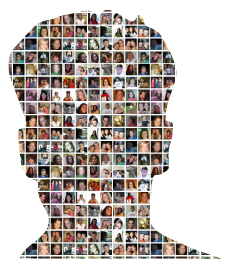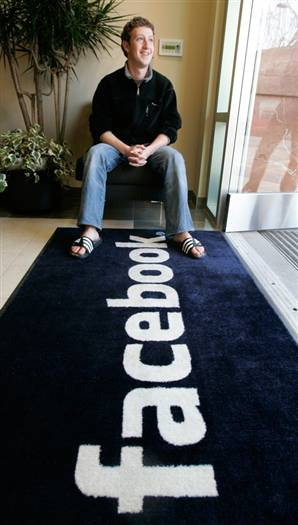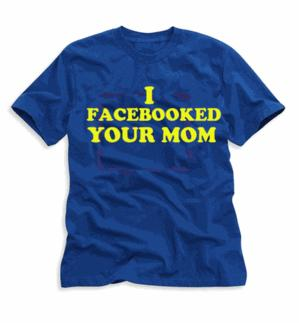I Lost my Wife to Facebook, and Other Myths that Might be True
by: Michele Byers / Saint Mary’s University

Collective Facebook
I first heard about Facebook a few months ago. My cousin, an undergraduate student, was having dinner at my house and mocking my husband mercilessly about his MySpace page. MySpace, she intoned, was over; Facebook was “it.” As a scholar of media, she found me guilty of not keeping up with the times. The Internet isn’t really one of my main research areas, I reasoned; I barely have time to keep up with my email. But I was intrigued. The only way to get into the Facebook system is to sign up and in so doing get a page of one’s own. I did so. A bare bones page… but four hours later I was still “on” Facebook, complaining to my husband about how few old friends I could find.
Facebook is a social networking site or social utility. It has one of those dizzying pedigrees we associate with the Internet age. In 2004, its creator, Mark Zuckerberg, began with the idea of developing an online version of the paper facebook produced for incoming students at Harvard, where he was a student. In less than a year he had dropped out of school and moved to California. Within the next six months, Facebook was made available to students at most universities in the US, soon high school students were invited to join, and networks were expanded to include Britain, Canada, and Australia. Less than two years after it began, Facebook opened its doors to the general public and was estimated to have 12 million users. Today it is said to have as many as 20 million users as rumours circulate that a buyout for as much as 2 billion dollars is in the works.

Mark Zuckerberg
Facebook is a strange place. You can provide an almost unlimited amount of personal information on your page. You can post pictures. You can engage in an ongoing commentary about your life, minute by minute. The system also creates a running mini-feed that lets you know every minute change any one of your “friends” effects on their pages. You can invite people you know and strangers to be your friends, to come to social events, or to join Facebook groups that you start or are merely a member of. A lot of people use Facebook like email. It’s a place to chat and to keep people informed about your life. But for some people — and this is how I, and I suspect many people my age (the over 35s, who are even older than 25–34 year old “oldies” discussed in one recent Globe & Mail article), get hooked on Facebook — it’s a place to find old friends that we weren’t likely to track down anywhere else. And this is where, I suspect, we differ from younger cohorts of Facebookers who probably aren’t as nostalgic as we are… yet.
Nostalgia is a definite key for many of the Facebookers I know — and I can’t quite believe how words like Facebooker and Facebooking flow out of me after just a few short weeks of interface. While quite a few of my “friends” are people I work with, live near, or am related to, the ones I really seek out and the ones I, in a sense, have thus far derived the greatest satisfaction from being connected to, are the old friends I lost touch with along the way. Frederic Jameson says that “an addiction to the photographic image is itself a tangible symptom of an omnipresent, omnivorous, and well-nigh libidinal historicism” (18), one that “cannibalizes” the past into a cacophony of “overstimulating ensembles” (19). This is an apt description of Facebook for many users (and perhaps of many users as well).
An April 23 editorial in the Toronto Star makes the libidinal quality of the Facebook experience explicit by suggesting that social networking sites are now rivaling Internet pornography for sheer number of users. Jen Gerson writes, “though the website du jour may change, the desire to be connected all the time isn’t going to go away among the youth cohort.” I agree, although I think the focus on youth misses the fact that people in their 30s, 40s, 50s (and so on) are increasingly using social networking sites to stay connected with their pasts as well as their presents. Here’s one example: I recently invited one of my best friends from high school, a busy working mom with four kids, to join Facebook. She so rarely responds to her email, I thought she’d just delete it. But, just a week later she sent me a message (on Facebook) saying she just couldn’t keep herself from trolling the system looking for old friends.
Linda Hutcheon makes the important point that a predilection for seeing postmodern culture and its artifacts as inherently nostalgic is something to be cautious of. She’s right of course. Nostalgia often implies the longing for a mythic past, whose doors, always barred to us, make what is behind them infinitely desirable and whose completedness masquerades as simplicity, as authenticity, as a time that was really “real.” We can go home, but we can’t go home. In her recent book, Giving An Account of Oneself, Judith Butler argues that one of the problems of doing so — of giving an account of oneself — is that there is always an originary part that we cannot know. A piece that is beyond language and memory but that is nonetheless foundational to who we are. We are, on some level, aware of this, and search for ways of contacting or connecting with this originary part for which we have no vocabulary of enunciation. This may be part of Facebook’s appeal. Many people are casting around in its multitudes looking for connections to a past they feel cut off from; from parts of themselves they think might be lost; for threads of a narrative that will allow them to give a fuller and more complete account of themselves.
And yet, is there an ironic aspect of Facebook? Is this type of postmodern cultural production/immersion (as we are both in it and, in a sense, co-producers of it) simply a reification of a mythic past, a giving in to longing for something unrecoverable, or do we engage with Facebook via an “ironic distance,” or both (Hutcheon)? Hutcheon argues that irony and nostalgia are both responses to things, rather than things in and of themselves. Facebook can be read as a space where irony and nostalgia co-exist, especially for those who use it to seek out the past. The pages and groups people create are genuine but evidence a type of ironic distancing that comes from a recognition that the people reading are, in some sense, at a temporal distance. These groups play a bit like the newest ad in the Diet Pepsi “Forever Young” campaign. Called “Make-Out,” the ad features a couple in their thirties who wish they could make-out like they did when they were teens… flash to them making out in the grocery store and at parent-teacher interviews to the 1983 Bonnie Tyler power-ballad “Total Eclipse of the Heart.” Happily, they return to their present, but with the recognition that Diet Pepsi keeps them young, connected to their youth… like Facebook.

Facebook T-shirt
Ironic, nostalgic, Facebook does have a high school quality. One friend told me she had resisted joining because of an experience on an earlier social utility: she kept looking for ex-boyfriends and their new girlfriends, comparing the “coolness” of their sites and hers, comparing the numbers of friends each had. It was, she finally explained, like being back in high school. Alyssa Schwartz, in the Globe & Mail, discovered similar invocations of a “high school mentality,” finding Facebook guilty of “bring[ing] back behavior that went out with plaid shirts, Tuff boots and Nirvana.” Note how Schwartz’s invocation of high school, here coded through fashion and music, marks the ironic nostalgia of Facebook participation, but also locates “old” Facebookers as people who were teens in the 1990s, not the 1980s (shoulder pads, doc martens, and Madonna), 1970s (hot pants, platform shoes, and Led Zepplin), or 1960s (mini skirts, saddle shoes, and The Beatles).
There is clearly much to be studied in the worlds of Facebook. The desire to network the past in the present, the availability and massive usage of this technology, certainly warrants closer examination.
Works Cited
Jen Gerson. “Social Networking rivals porn on Web.” The Toronto Star. April 23, 2007.
Linda Hutcheon. “Irony, Nostalgia, and the Postmodern.”
Fredric Jameson. Postmodernism or, the Cultural Logic of Late Capitalism. Durham: Duke UP: 1991.
Alyssa Schwartz. “Grownups get their Facebook fix.” Globe & Mail. March 31, 2007.
Image Credits:
1. Collective Facebook
2. Mark Zuckerberg
3. Facebook T-shirt
Please feel free to comment.
Ironic, nostalgic, Facebook does have a high school quality. One friend told me she had resisted joining because of an experience on an earlier social utility: she kept looking for ex-boyfriends and their new girlfriends, comparing the “coolness” of their sites and hers, comparing the numbers of friends each had. It was, she finally explained, like being back in high school.
I wonder if the similarity to high school has to do with being embedded in a community to that degree — I think most of us, as adults, can avoid our recent pasts as much as we’d like, usually. We don’t have to sit in the same row as our ex-boyfriend when we go into studyhall, his new girlfriend isn’t that cheerleader from third-period geometry.
Perhaps Facebook really does echo the meet sheets (which were nicknamed “meat sheets” at my undergraduate alma mater) that it was based on; it provides a sort of quick and dirty guide to an entire network of people, and it gives you obscure information about people you’ve barely met. And, I wonder to what degree these sorts of behaviors indicate that it’s not that we wouldn’t behave the way we did in high school now that we’re older, but that we can’t — or at least we couldn’t until the social networking site boom.
Byers’ interest in Facebook as a network interface invoking irony and nostalgia in its users is interesting considering the other various networking sites currently active and utilized. I’m thinking here specifically of Myspace (of which she mentions) and Friendster—the former which was developed for musicians and has become an exponentially enormous site for social/personal networking among college, grad student, and late twenties users, and the latter which seems to appeal to a slightly…older (?) demographic than those of Myspace. I’ve associated Facebook, however, with a slightly younger population—college students and teens at large. Thus, to read about Byers’ investment in nostalgia from a different generational perspective is striking. I wonder to what extent irony is in play with nostalgia; that is to say, if with age and/or professionalism, one must embrace a level of irony in order to justify (literally) subscribing to the (online and revolutionized) antics of freshmen college days.
Of course, this assumes a level of cultural (educational) and technological (internet) access. The other day I was meandering through the Austin public library and in passing by the computers with internet connections I noticed a man who appeared to be homeless (or at least extremely poor and/or incredibly unkempt) browsing on Myspace. Frighteningly, though I suppose not surprisingly, he was looking at sexually provocative images of women (or girls) on their own Myspace pages. Voyeurism of course plays a substantial role in social interfaces—as Byers notes even, for people “checking out” their “competition.” This led me to consider if one has access to the internet yet s/he never experienced the facebook or yearbook phenomenon of college or even high school years, in what ways, if any, does the sense of irony and nostalgia operate?
Carly: you make two great points. 1) “…if one has access to the internet yet s/he never experienced the facebook or yearbook phenomenon of college or even high school years, in what ways, if any, does the sense of irony and nostalgia operate?” And this begs the question: beyond irony and nostalgia, what other modes of reception/production are operating on facebook? I imagine it’s a vast spectrum of social engagement. Sincere nostalgia? Youthful irony? Detached exhibitionism? Lustful voyeurism? Simple curiosity? Or any combination above and more. And, are these modes of engagement consistent across other social networking sites? Myspace? Friendster? If so, How? Why? Or why not?
Good time for me to read this: I just got onto Facebook this week. Don’t know why I caved to pressure, but I came in grumbling, ready to dislike it. But one thing that I’ve loved is that it makes keeping in touch so very simple. To use the high school metaphor, it’s like the people you rarely talked to, but would nod and smile at, and have occasional conversations with, and Facebook seems to allow that kind of connection — someone can be listed as a “friend,” actually *be* a friend, and yet not be in contact for ages, because the mini-feed and so forth are enough to keep a semblance of connection: like nodding when you pass someone in the halls. Thus, while I expected I’d dislike Facebook because it seemed to require far too much effort and work, the delight has been that it allows me to avoid the effort and the work — not that I don’t care about my friends, but sometimes I just wanna know they’re okay and nod at them in the hall. And perhaps this function is heightened for the many of us academics who’ve moved, often multiple times, for work, away from the physical possibility of a nod?
An interesting piece; what I’d love to see is some socio-demographic stats on who the actual users are and how that breaks down across these various services (counting Twitter as well, the mini-app for basically one-line status updates that is analogous to that feature in Facebook.)
I was invited to participate in a closed beta of an intermediate revamp of Friendster after I did a theoretical case study on how it could be redesigned (at the time its interface was terrible); I got a lot of insight from talking to their product managers.
Friendster’s biggest user group now are Filipinos, either in the Philippines or expatriates. The service was made available on mobile phones there and it took off — there was some sort of cultural ‘click’ that happened that reached a kind of critical mass. Similarly, Orkut, the Google-owned social networking system, is now almost exclusively Brazilian.
Facebook, having started with a “class” of people in post-secondary education, seems to be generating a userbase of educated, largely middle- and upper-middle class North Americans. Anecdotally, I had lots of local friends on Friendster when it first started, but along the way it kind of ‘died on the vine’ among us even as its overseas users soared…this requires further study I think.
Pingback: Le Blogueur » Blog Archive » Google et Microsoft se battent pour Facebook
No privacy at all…………….it is a dating site diminishing moral values. What a controvercial scenarion to observe…………..that 5 people are busy with facebook while living under the same roof…………..they dont improve a social bound within theselve and looking for people far away from them.And one day they realise that they have gone far from each other emotionally they have lived with in the same house….
social networking is bad for your life. useless and shallow addiction. flirt flirt flirt.